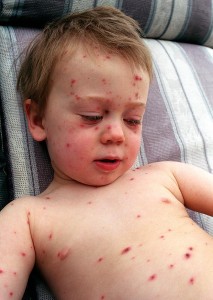The super bowl will be played tomorrow and there is some concern that with so many people in one place, there is danger that the recent measles outbreak may lead to cases from those attending the game, particularly as there have been cases reported in Arizona. But wait, wasn’t measles declared eliminated in the U.S.? Yes, it was, back in 2000. The problem is not that the vaccine has stopped working; it’s that there are a substantial number of parents – especially in California – who refuse to have their children vaccinated. It’s bad enough that this endangers the children of these parents, but it also endangers others, particularly infants who are too young to be vaccinated, pregnant women, or people with immune problems that prevent them from being vaccinated. There was a story recently on NPR about such a child, recovering from leukemia, whose father it asking that the school in Marin County, California, his son attends bar students from attending who have not been vaccinated.
Why are the parents refusing to have their children vaccinated? Because they have bought in to the anti-vaccine movement which claims a link between vaccination and autism. This idea comes from an article by Andrew Wakefield published in the medical journal The Lancet in 1998. The article has long since been discredited and Wakefield, based on evidence that the study was fraudulent and that Wakefield had a financial conflict of interest, has been bared from practicing medicine in Britain. All the available scientific evidence indicates that there is no link between vaccinations and autism. That evidence has not been enough to convince doubters, which include some politicians (Michele Bachmann) and TV personalities (Jenny McCarthy). In addition to citing the junk science represented by Wakefield, such voices also talk about parental rights. However, individual rights have to be seen within the context of social responsibility – no one has absolute rights to take actions that endanger others.
This phenomenon is one more case of willful ignorance, the refusal to accept evidence-based science. We continue to see this among evolution deniers and those who don’t believe in global warming. A recent survey by the Pew Research Center indicates how large the gulf is between the views of scientists in the U.S. and non-scientists across a wide range of issues. The results confirm the importance of encouraging more attention in our schools to critical thinking and the process of scientific enquiry.

